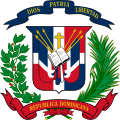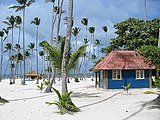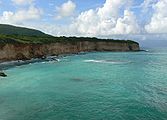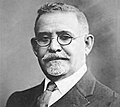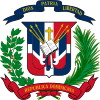Portal:Dominican Republic
Introduction
The Dominican Republic is a country on the island of Hispaniola in the Greater Antilles archipelago of the Caribbean Sea, bordered by the Atlantic Ocean to the north. It occupies the eastern five-eighths of the island, which it shares with Haiti, making Hispaniola one of only two Caribbean islands, along with Saint Martin, that is shared by two sovereign states. It is the second-largest nation in the Antilles by area (after Cuba) at 48,671 square kilometers (18,792 sq mi), and second-largest by population, with approximately 11.4 million people in 2024, of whom approximately 3.6 million live in the metropolitan area of Santo Domingo, the capital city. The Dominican people declared independence from Spain in November 1821. The colony of Santo Domingo was regionally divided with many rival and competing provincial leaders during the 1800s. Dominicans were often at war fighting against the French, Haitians, Spanish, or amongst themselves, resulting in a society heavily influenced by military strongmen. Santo Domingo attained independence as the Dominican Republic in 1844 when Dominican nationalists led an insurrection against the Haitians. Over the next decades, the Dominican Republic experienced several civil wars, battles against Haiti, and a brief return to Spanish colonial status, before permanently ousting the Spanish during the Dominican War of Restoration of 1863–1865. The U.S. occupied the Dominican Republic (1916–1924) due to threats of defaulting on foreign debts; a subsequent calm and prosperous six-year period under Horacio Vásquez followed. From 1930 the dictatorship of Rafael Leónidas Trujillo ruled until his assassination in 1961. Juan Bosch was elected president in 1962 but was deposed in a military coup in 1963. A civil war in 1965, the country's last, was ended by U.S. military intervention and was followed by the authoritarian rule of Joaquín Balaguer (1966–1978 and 1986–1996). Since 1978, the Dominican Republic has moved toward representative democracy. The Dominican Republic has the largest economy (according to the U.S. State Department and the World Bank) in the Caribbean and Central American region and is the seventh-largest economy in Latin America. Over the last 25 years, the Dominican Republic has had the fastest-growing economy in the Western Hemisphere – with an average real GDP growth rate of 5.3% between 1992 and 2018. GDP growth in 2014 and 2015 reached 7.3 and 7.0%, respectively, the highest in the Western Hemisphere. Recent growth has been driven by construction, manufacturing, tourism, and mining. The country is the site of the third largest (in terms of production) gold mine in the world, the Pueblo Viejo mine. (Full article...) Selected article -Lesbian, gay, bisexual, and transgender (LGBT) people in the Dominican Republic do not possess the same legal protections as non-LGBT residents, and face social challenges that are not experienced by other people. While the Dominican Criminal Code does not expressly prohibit same-sex sexual relations or cross-dressing, it also does not address discrimination or harassment on the account of sexual orientation or gender identity, nor does it recognize same-sex unions in any form, whether it be marriage or partnerships. Households headed by same-sex couples are also not eligible for any of the same rights given to opposite-sex married couples, as same-sex marriage is constitutionally banned in the country. A majority of Dominicans affiliate with the Catholic Church. As such, attitudes towards members of the LGBT community tend to reflect prevailing Catholic morals. Support for same-sex marriage was 25% according to a 2013/2014 opinion poll. (Full article...)General images -The following are images from various Dominican Republic-related articles on Wikipedia.
Selected picture -An aerial view of the Punta Cana International Airport
Selected biography -Juan Cespedes Uribe Tena (born March 22, 1979) is a Dominican former professional baseball infielder. He played shortstop, third base and second base during his career in Major League Baseball (MLB) for the Colorado Rockies, Chicago White Sox, San Francisco Giants, Los Angeles Dodgers, Atlanta Braves, New York Mets and Cleveland Indians. He bats and throws right-handed. Uribe began his professional career in 1997 when he was signed by the Colorado Rockies. After advancing through the minors, he made his MLB debut with the Rockies in 2001. He became their shortstop in 2001 and spent all of 2002 in that capacity. He missed part of 2003 with an injury and was traded to the Chicago White Sox following the season. After one season as a utility player, Uribe became the starting shortstop for the White Sox in 2005; he held that position for the next three years. While Uribe was with the White Sox, the team won the 2005 World Series against the Houston Astros. Uribe hit 21 home runs in 2006 but had a low on-base percentage. He hit 20 home runs in 2007 but had a low batting average with runners in scoring position (RISP). In 2008, Uribe lost his starting shortstop role to Orlando Cabrera and shifted to the starter at second, but then lost that job to rookie Alexei Ramírez. He eventually ended the season as the team's third baseman due to an injury to Joe Crede. (Full article...)Related portalsWikiProjects
Things to do
Associated WikimediaThe following Wikimedia Foundation sister projects provide more on this subject:
SourcesDiscover Wikipedia using portals | |||||||||||||||||||||||||

